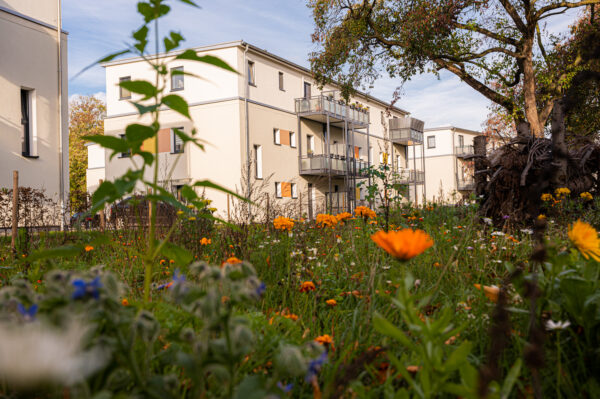Sustainable Corporate Strategy
Sustainable and Long-Term Growth
Vonovia’s business model is based on three pillars: the rental of good-quality, modern living space at fair prices, the development and construction of new apartments, both for its own portfolio and for sale to third parties, and the provision of housing-related services. Like all providers of homes, we face the challenge of countering the social megatrends of climate change, urbanization and demographic change with appropriate strategies and solutions (see Vonovia in the Context of Current Trends and Developments).
In order to keep our business model fit for the future and adapt it to the current challenges, we have been pursuing our 4+2 corporate strategy since our initial listing in 2013. The four pillars – property management, financing, portfolio management and Value-add – are complemented by opportunistic acquisitions and measures for the internationalization of Vonovia. The successful merger with Deutsche Wohnen is the result of the continuation of our sustainable growth strategy. This merger has allowed us to tap into new synergies, harmonize processes and make processes even more efficient. At the same time, managing with integrity, the sustainability of the business model and the extent to which the company is perceived as living up to its social responsibilities are playing an increasingly important role at Vonovia.
More information about our 4+2 strategy is available in our 2022 Annual Report.
Vonovia’s corporate strategy has also proven to be robust and resilient in the face of the impact of Russia’s invasion of Ukraine and the coronavirus pandemic. Our digitalization ambitions and measures in particular enabled us to not only keep our business processes running more or less smoothly, but also to develop them further (see Digitalization and Data Security).
We continuously adapt our strategy and focus particularly on highlighting the sustainability aspects. The Sustainable Governance and Responsible Business Practices action area stipulates the guidelines and principles of our corporate governance and compliance and ensures our sustainable and long-term success on the capital market for our future viability.
Since 2021, Vonovia’s remuneration structure for the Management Board and top management levels has been linked to the achievement of sustainability targets. This is a clear expression of the relevance of the strategic direction toward sustainability at Vonovia. The sustainability targets are defined in our sustainability performance index (SPI). The SPI came to 103% in the 2022 reporting year. A detailed description of our Management System is provided in our 2022 Annual Report. Further information is available in the remuneration report.
Elements of Long-term Variable Management Board Remuneration
- Relative Total Shareholder Return (relative TSR)
- NTA (Net Tangible Assets) per share
- Group FFO (Funds from Operations) per share
- Sustainability Performance Index (SPI)
Management of Opportunities and Risks
Assessing the risk related to sustainability factors is becoming increasingly important in the list of requirements that investors and analysts look at. The recommendations made by the Task Force on Climate-related Financial Disclosures (TCFD) are in response to this trend. They serve to highlight the direct and indirect financial risks and opportunities arising from climate change and make them transparent (see Implementation of the TCFD Recommendations).
Vonovia has a comprehensive risk management system in place that enables it to identify, assign weightings to, and manage opportunities and risks relevant to the company. This:
- Reduces potential threats
- Secures the future viability of the company
- Promotes our strategic development
- Helps us to act sustainably
Vonovia’s risk management system was aligned with the sustainability aspects of the corporate strategy. For risks with an explicit sustainability aspect, not only the impacts on Vonovia (outside-in perspective) are taken into consideration but also any impact these risks may have on the environment and society (inside-out perspective).
For transparency purposes, we explain the risk situation at Vonovia in detail in our Annual Report and provide an up-to-date risk assessment on behalf of the Management Board (see Current Risk Assessment). We also provide a wide range of information in this sustainability report based on the TCFD framework for disclosing climate-related risks (see Implementation of the TCFD Recommendations).
For the current reporting year, the identified sustainability risks were classed as “green” with one exception. This means that the potential amount of loss is low and the probability of occurrence is very low.
The yellow risk “Unfavorable carbon tax” has been assigned an expected amount of loss of € 40–150 million (2021: € 25–100 million) and is still assessed as having a probability of occurrence of 60–95%. The legislation on the carbon tax introduced by the German government could entail risks for Vonovia with the potential to negatively impact Adjusted EBITDA in the Rental segment. In order to limit this risk, Vonovia has implemented a program for energy-efficient refurbishments within its portfolio and is researching new methods for carbon-reduced energy production (power-heat coupling, sector coupling, etc.).
The Management Board bears full responsibility for risk management. The Head of Controlling reports to the CFO and is responsible for the operational management of the risk management system. Risk Controlling initiates the periodic risk management process and consolidates and validates the reported risks with the assistance of risk owners – managers at the level directly below the Management Board (see Opportunities and Risks).
Identified Sustainability Risks
- Unfavorable carbon tax
- Risk of non-compliance with the climate path
- Risk of business continuity in disasters/crisis situations
- Risks resulting from climate change
- Risks from the design and implementation of business models
- Procurement price risk in the area of our energy services
- Procurement risks in relation to the expansion of renewable energy through photovoltaics
- Risk of breaches of provisions concerning special contractual rights (social charters)
- Risk of non-compliance with legislation on occupational health and safety management
- Risk of losing sustainable financing
- Risk of non-compliance with operator obligations
- Risks associated with non-compliance with statutory requirements and investor or analyst expectations regarding ongoing sustainability reporting


